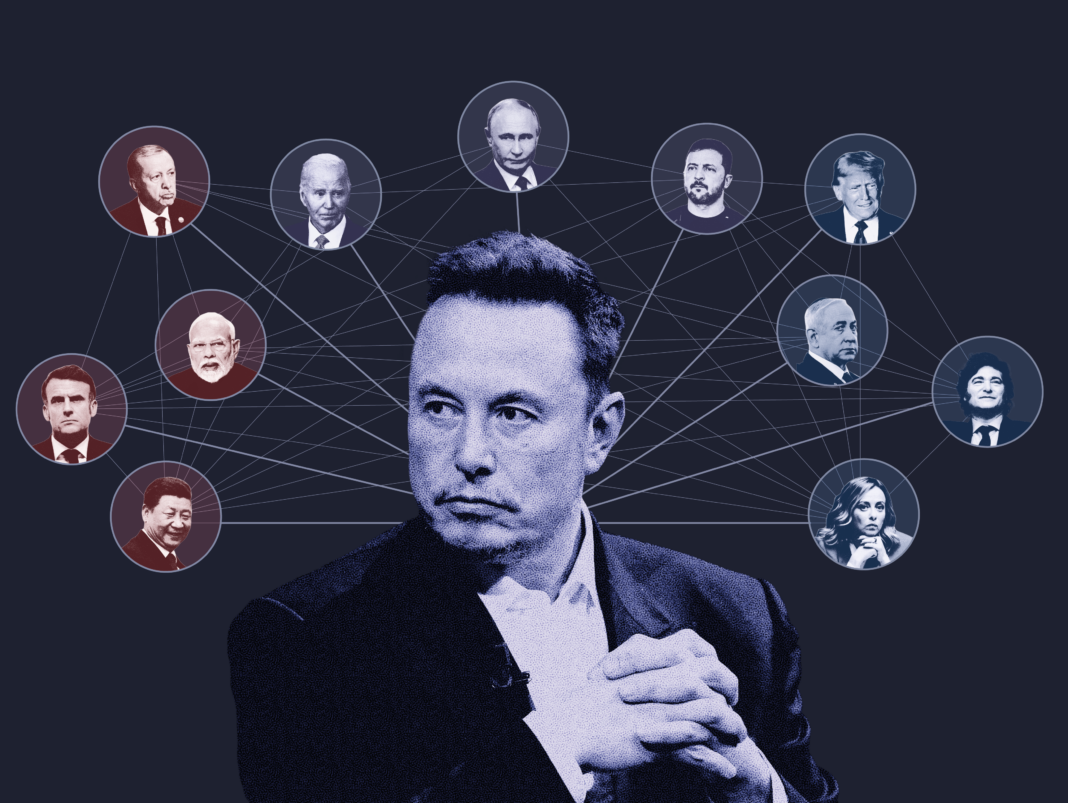Elon Musk maintains global connections, including friendships with tech moguls and world leaders, notably having a two-year correspondence with Russian President Vladimir Putin. As he supports Donald Trump’s presidential bid, speculation arises about Musk’s potential role in a Trump administration, which could extend his geopolitical influence. Musk’s interactions with leaders, particularly regarding Tesla’s establishment in China, as well as his control over SpaceX’s Starlink network, raise concerns over national interests and political motivations, exemplified by his controversial stance in the Ukraine conflict and relations with Taiwan.
Elon Musk is known for his connections with tech entrepreneurs in Silicon Valley, high-profile dates with supermodels, and dinners with politicians like Giorgia Meloni. He has a network of friends around the globe.
Among his notable acquaintances is reportedly Russian President Vladimir Putin. According to a recent report from the Wall Street Journal, citing American and Russian sources, Musk and Putin have been in regular contact for at least the past two years. Their discussions range from personal matters and business dealings to international politics.
This revelation, coming just ahead of the American presidential elections, has generated significant buzz. Musk is a supporter of Donald Trump’s candidacy and is rumored to be eyeing a position in the administration if Trump wins.
Musk’s alleged connection with Putin carries geopolitical weight. The world’s richest person has established himself as a significant global player, as seen through his prominent companies that already impact global politics. Should he join a Trump administration, Musk could greatly amplify his geopolitical influence.
Musk, Tesla, and Relations with China
Many of Musk’s connections with political leaders originated during the early days of Tesla. In 2012, Tesla launched the Model S, the first mass-produced electric vehicle. As politicians worldwide advocate for the energy transition, Musk provides the vehicles needed for this shift.
Musk maintains control at Tesla, recently receiving shareholder approval for a bonus that could exceed $50 billion over ten years. He is also consolidating power within the board of directors.
Government leaders and economic ministers globally are eager to attract Musk, hoping to host Tesla’s next factory. Since summer 2021, Musk has met with at least 15 heads of state or senior ministers to discuss potential Tesla facilities in their countries, including France’s president and Turkey’s president. India’s Prime Minister even highlighted plans for a new Gigafactory during his campaign events earlier this year.
A key figure interested in Tesla has been Chinese President Xi Jinping. Since 2018, Xi has aimed to position China as a leader in electric vehicles despite U.S. trade restrictions, viewing Musk as a tech visionary without a political agenda.
In 2019, Xi allowed Tesla to maintain full control over its Chinese operations, marking Tesla as the first foreign automaker to do so. Production began in Shanghai that same year.
Five years later, the landscape has shifted. Xi has achieved his goal, and China now leads in the production of electric vehicles. Chinese manufacturer BYD dominates the domestic market with over 35 percent market share, compared to Tesla’s 6 percent. Nevertheless, for Tesla, China remains the most crucial market after the U.S.
While China could sustain its leadership in electric vehicles without Musk, Musk cannot afford to overlook China. A substantial portion of his wealth is tied to Tesla stocks, motivating him to cultivate strong relations with Beijing and frequently engage with government officials.
Musk as a Potential Lobbyist for Xi
Trump’s stance towards China has been less diplomatic. During his presidency from 2017 to 2021, he initiated a trade dispute with China, which he plans to continue if reelected, proposing to raise import tariffs on Chinese goods to 60 percent.
Should Trump win again, Beijing might anticipate that Musk would advocate for its interests to the president, especially if he were to become a member of the administration, likely balancing his business interests as well. Political scientist Ian Bremmer, founder of the Eurasia Group consultancy, pointed out Musk’s meeting with Chinese Premier Li Qiang in April. Subsequently, Trump discussed the possibility of Chinese EV manufacturers producing in the U.S. at the Republican National Convention.
As the Chinese market is vital for Tesla, Xi holds sway over Musk and his businesses, a dynamic also recognized by Putin. Reportedly, Putin asked Musk not to activate his Starlink satellite internet over Taiwan as a favor to Beijing.
Musk, Starlink, and the Ukraine War
Starlink is managed by Musk’s SpaceX, which he founded in 2002. SpaceX has transformed space travel with its reusable rockets, significantly reducing launch costs that competitors struggle to match. The company is also working on Musk’s current project, Starship.
Thomas Zurbuchen, the former NASA director, noted that Starship revolutionizes the aerospace industry, drastically lowering the costs associated with transporting materials to space, thus fueling the commercialization of space. Musk is poised to play a leading role in building a permanent lunar base and eventually sending humans to Mars.
Currently, SpaceX dominates space operations with its Falcon 9 rockets, which are crucial to the U.S. government. The
